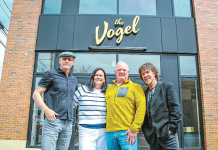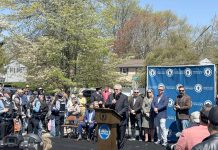
By Allison Perrine
OCEANPORT – Monmouth Park is on course to be the first racetrack in the U.S. to offer fixed odds wagering to its bettors, officials told The Two River Times this week.
Gov. Phil Murphy signed legislation Aug. 5 clearing the way for the new betting option, which Dennis Drazin, chairman and CEO of Darby Development LLC, the operator of Monmouth Park, called “the future of gambling.” It will allow bettors to lock in the odds at the time of their bets as opposed to pari-mutuel wagering when odds are not finalized until all betting is completed.
“Monmouth Park always looks to be a leader in gaming opportunities,” said Drazin. “We want to present opportunities for people to wager on our signals and come to Monmouth Park.”
To help the layman understand fixed odds wagering, Drazin gave the example of placing a bet on a horse when its odds are 2-1. Those odds can change as more people bet on the horse, potentially changing the odds to 1-2 by the time the horses run a few yards after breaking out of the gate.
“A lot of our patrons think something’s wrong. They say, ‘Why did the odds change after the horses broke out of the gate?’ We don’t let anyone bet once the horses break out of the gate – not in pari-mutuel wagering,” said Drazin. “So fixed odds wagering gives the consumer the ability to go to the track or bet from home or casinos… and you get the odds that you wager. It doesn’t change.”
Drazin started looking at fixed odds wagering in other parts of the world about a year and a half ago, shortly before the COVID-19 pandemic. He was approached by the Australian-based BetMakers Technology Group which expressed interest in partnering with Monmouth Park on fixed odds wagering.
“I guess the thing that impressed me was that in Australia they have 30 million people and they bet $30 billion (Australian dollars) on horse racing; in America, we have 300 million people and we only bet $10 billion,” said Drazin. “So it’s worked over there to grow their handle.”
He expects fixed odds betting to be popular at Monmouth Park, particularly appealing to the younger demographic. But it may not be favored by everyone. Drazin said the older demographic may be used to the existing pari-mutuel wagering style when all bets are pooled together, taxed, fees deducted, and payouts calculated by sharing the pooled monies amongst the winning wagers. Additionally, some track operators and horsemen across the country fear fixed odds wagering could “cannibalize” the current volume of their bettors, he said.
“If you go to Monmouth Park and you bet $2 to win on a horse, there’s takeout of 17 percent when you bet win, place, show… and bettors will get back $0.83 on their dollar,” said Drazin, adding that the 17 percent is used to pay the horsemen, signal costs, and other fees. “In the fixed odds wagering, the takeout is lower and the payment to the horsemen and the operator is lower. So you have to do an increase in your volume in order to be successful.”
But Drazin sees the positive.
“Right now, horse racing gets the attention of the eyes that follow horse racing…but that’s a very small percentage of the overall population that bets on gaming throughout the world,” said Drazin. Over the next five years, gradually, he expects all sports book, casino and online operators like the “FanDuels and DraftKings of the world” will offer fixed odds wagering and attract “20 times the amount of eyes who have opportunities to bet on your sport.”
Drazin said that although he does not know exactly when the park will get the go-ahead to implement fixed odds wagering, it will follow the release of regulatory approval from the New Jersey Racing Commission and the Division of Gaming Enforcement.
Some local leaders in the Two River area had a hand in establishing Assembly Bill No. 4909/Senate Bill No. 3090, including Sen. Vin Gopal (D-11), one of four sponsors, and Sen. Declan O’Scanlon (R-13), one of two co-sponsors.
“I’ve been a believer in government erring on the side of being permissive rather than restrictive unless there’s a certain compelling reason to be restrictive,” O’Scanlon told The Two River Times. “It seems perfectly reasonable, it’s done in other parts of the world, and we should let them do it.”
This is not the first time Monmouth Park has been a national leader in the sports betting world. Years ago, Monmouth Park, with the state Thoroughbred Horsemen’s Association and state of New Jersey, litigated against four major professional sports leagues and the National Collegiate Athletic Association (NCAA) to fight the Professional and Amateur Sports Protection Act (PASPA) of 1992. After years-long deliberation, in 2018, the U.S. Supreme Court sided with their claim that PASPA was unconstitutional.
“We were ultimately successful, although I didn’t think it would take eight years. It was because of Monmouth Park’s efforts that sports betting exists in this country now,”
said Drazin.
The article originally appeared in the August 12 – 18, 2021 print edition of The Two River Times.














